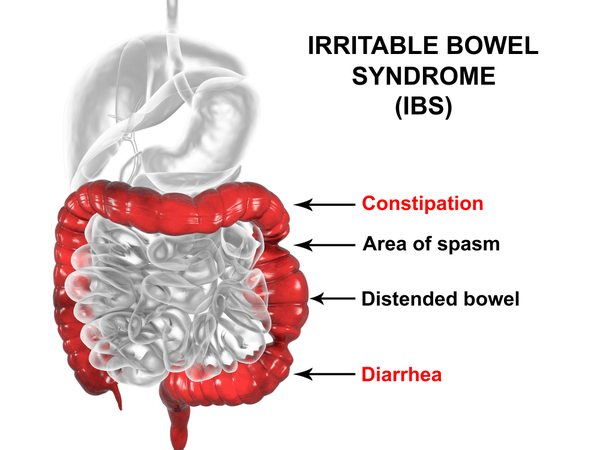IBS-D can affect any gender and any age group, but young females are more commonly affected than males or older people.
The diagnosis is based on a thorough medical history and physical exam. Doctors use a tool called the Rome criteria, a list of specific symptoms and factors that can help determine if someone has IBS-D. The most important of these criteria include the presence of abdominal pain or discomfort and change in bowel habits. There are no lab tests or imaging studies that can confirm a diagnosis of IBS-D. But limited testing (such as blood work or imaging studies) may be necessary to be sure the symptoms are not being caused by some other condition.
IBS-D is not life-threatening. It can, however, affect a person’s quality of life. There is no cure, so the goal of treatment is to reduce symptoms as much as possible. Some treatments may be aimed at improving the uncomfortable symptoms of IBS-D – such as abdominal pain, discomfort or bloating. Other treatments may focus on improving bowel function. Treatments include lifestyle modifications, dietary changes, psychosocial therapy, and medications.
Dietary therapy:
In some patients with mild IBS-D, lifestyle and dietary changes can control symptoms completely. Specific foods that cause symptoms vary widely from patient to patient. There are no reliable tests to identify which foods may trigger symptoms, but some foods containing lactose or gluten are common problem foods for people with IBS-D. For those people, avoiding these foods can improve symptoms.
For other people, it is not easy to figure out what foods may be “triggering” their symptoms. In these cases, symptoms may improve with a diet low in FODMAPs (Fermentable Oligosaccharides, Disaccharides, Monosaccharides And Polyols) or foods low in a type of sugar called fructose (which is found in many types of fruit). Avoiding foods that are known to cause increased gas production, such as onions, celery, carrots, beans, prunes, wheat, alcohol or caffeine, can help.
These diets are not easy to follow. When attempting diets that exclude entire types or groups of food, it is often helpful to work with a dietitian to be sure the restricted diet is both safe and nutritious.
Medical therapy:
If a person’s symptoms do not improve despite dietary changes, there are several kinds of medication that can help.
Medications for abdominal discomfort:
Antispasmodics are a group of medicines thought to relax smooth muscle in the intestine. They are commonly used to treat IBS. These medications may reduce pain, bloating and the urgent need to go to the bathroom. Commonly prescribed anti-spasmodics include dicyclomine and hyoscyamine. Over-the-counter preparations of peppermint oil also have been found to have similar benefits.
Medications to improve bowel function:
For people whose main symptom is diarrhea, fiber supplements often are the first treatment recommended. Fiber can add form to stool and make it less loose or watery. Anti-diarrheal products, such as loperamide, also work to decrease diarrhea. These medications slow down the contractions of the gut, giving the intestine more time to absorb water from the digested food. This lessens the stool volume and frequency and makes the stool more solid.
Bile, a substance produced by the liver, enters the upper part of the small intestine. Most of the bile is reabsorbed as it moves further down in the small intestine. If not enough bile gets reabsorbed before it reaches the large intestine (colon), it can cause diarrhea. In some IBS-D patients, a medication that binds the extra bile can be used to reduce diarrhea.
For people with IBS-D who keep having symptoms despite trying some of the above-mentioned treatments, there are other medical options, including antibiotics and a medication to block pain specifically in the intestine.
Probiotics
Bacteria are naturally present in the intestines or “gut” of humans, and they play an important role in normal bowel health and function. “Probiotic” products are foods or pills that contain live bacteria that may promote gut health. They are sometimes recommended with the goal of changing the types of gut bacteria in the intestine. This can sometimes reduce abdominal discomfort, bloating and gas from IBS-D. Experts are not sure of the overall benefit of probiotics for people with IBS; the most beneficial types and amounts of probiotic foods or supplements also is not known.
Antibiotics are another way to change the population of bacteria in the gut. While antibiotics sometimes provide relief of IBS symptoms, there are potential risks associated with frequent use. If antibiotics are used too often, they can become less effective, and the risk for developing serious infections increases. These risks are reduced when a non-absorbable antibiotic such as rifaximin is used, which has shown some benefit in the treatment of IBS-D.
Lastly, stress and anxiety play a major role in some cases of IBS-D. If these are a known trigger of symptoms, it is best to discuss these openly with your healthcare provider and other caregivers to find ways to reduce stress and anxiety. Doctors might also suggest antidepressant medications to lessen symptoms.
If you have chronic symptoms of diarrhea and discomfort, see your doctor for a diagnosis and treatment plan to help reduce and manage symptoms, improve bowel function and increase comfort. Such a plan can improve your quality of life.
In addition, if you use over-the-counter medications regularly to reduce symptoms, you should consult a doctor to determine the best course of treatment.
Also report abdominal discomfort or symptoms that come with weight loss, bleeding, iron deficiency (low levels of iron based on blood tests) or symptoms that start after age 50. Tell your doctor about any personal or family history of gastrointestinal diseases such as cancer or inflammatory bowel disease or celiac disease.
To find a doctor near you who is a member of the American Society for Gastrointestinal Endoscopy, use the ASGE Find a Doctor tool at www.asge.org.








